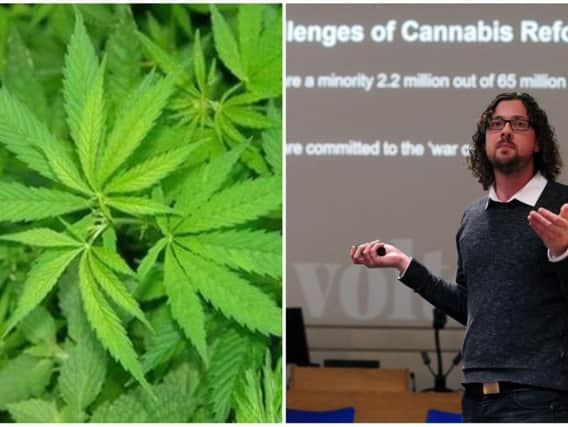What think tank VolteFace told Leeds audience about reforming cannabis legislation


When Leeds University’s debating society hosted a roadshow event, the prevailing opinion was that the current policies are not working.
But finding a consensus on an alternative model is by no means simple, with myriad arguments about economics, public health and education all needing consideration.
Advertisement
Hide AdAdvertisement
Hide AdFor now, the think tank’s priority is to engage people and start the conversation.
“People have quite strong moral reactions to drug reform,” said VolteFace policy advisor Paul North. “Normally people are yes or no. The reason for that is there’s a lot of criminality associated with drug reform.”
Figures shared with the YEP by the think tank show significant increases in the number of arrests for possession of the Class B drug and for possession with intent to supply here in Leeds.
Arrests for possession are down 56 per cent over the last 10 years nationally, but rose by 430 per cent in our city.
Advertisement
Hide AdAdvertisement
Hide AdAnd while the number of people seeking treatment for problematic cannabis use has risen by 55 per cent nationally over the same period, the Leeds figure stands at 79 per cent.
However, the proportion of people using the drug is only estimated to be around three per cent of the population.
Combine the usage of cannabis by a minority with the strong moral reaction many have to legalisation and Volteface say you begin to see why neither major political party focused on the issue in their last manifestos.
Mr North said: “Theresa May is committed to a ‘war on drugs’. She said in Parliament ‘that’s our stance’.
Advertisement
Hide AdAdvertisement
Hide Ad“Labour on the other hand are very confused. Corbyn doesn’t speak on it, Diane Abbott said the war on drugs isn’t working but they won’t do anything about it.”
He said the think tank believes the key is inclusive policy “that 65m people are going to benefit from” or, at the very least, see the sense in.
“We think we need to create reform that protects young people,” Mr North said.
“Reducing the power of criminal gangs, again most people are alright with that.
Advertisement
Hide AdAdvertisement
Hide Ad“The third one most people are alright with is creating jobs and an economy, it’s just about how you get there.”
Canada is moving towards legalising cannabis with a model which distinguishes between medicinal and adult use, seeks to eliminate the illicit market and protect children, and aims to benefit wider society, not just consumers.
Those who want to see similar policy changes here for economic reasons contend that some of the funds raised through taxation of a legalised market could be ploughed back into treatment services and educational programmes.
Others argue that illicit markets make it harder for people with problematic use to access support, partly because of the stigma surrounding it.
Advertisement
Hide AdAdvertisement
Hide AdMr North said: “The typical problematic cannabis user is withdrawn, staying away from society. They are typically a bit younger. That’s a hard group to get into drug treatment.”
While some fear legalisation would make usage more widspread, those pressing for change respond that it would be easier to promote public health messages if cannabis was to be legalised.
A regulated market might also see increased availability of milder forms of cannabis at a time when street supplies are increasingly dominated by stronger strains such as skunk, which is considered to be more highly addictive and to present a greater risk of psychological damage among users.
But Mr North said there is little chance of any of this while the drug remains illegal.
Advertisement
Hide AdAdvertisement
Hide AdCriminal gangs, he argued, want to protect their market so “the potency is high to create dependency”.
VolteFace is of the view that it is only through some form of regulated market, rather than simple decriminalisation, that the financial rewards can be shared by wider society and not just criminal gang as at present.
“Decriminalisation places it in the hands of the criminals still,” Mr North told the roadshow audience in Leeds. “The only sensible option is a regulated market.”
